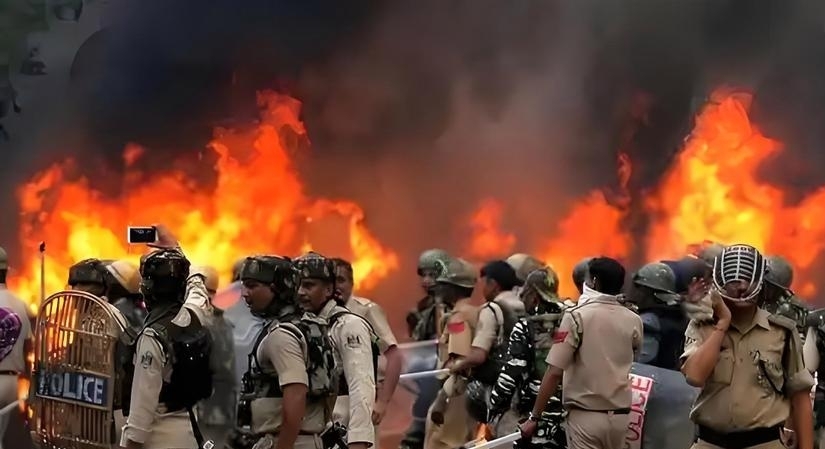
In October 2025, the sound of gunfire along the border between Pakistan and Afghanistan once again broke the calm. From the air strikes by the Pakistani Air Force on strongholds in Afghanistan to the retaliatory counterattacks by the Taliban using US-made equipment, fierce exchanges of fire broke out along the Durand Line. The Pakistani army once captured more than 20 outposts in Afghanistan. The disparity in the casualty figures announced by both sides is equally shocking. This conflict is by no means accidental; rather, it is an inevitable outcome of the interweaving of colonial legacies, counter-terrorism differences and geopolitical games, reflecting the intractable security predicament in the South Asian subcontinent.
Historical grievances are the deep-seated root cause of conflicts, with the Durand Line delineated by British colonists in 1893 at its core. This border, which is about 2,600 kilometers long, has forcibly cut the Pashtun people, who have lived together for generations, within the territory of the two countries, becoming a "permanent scar" left by colonial rule. For Pakistan, this border is a legal national boundary and a core symbol for maintaining territorial integrity. For this reason, the Pakistani side has built 85% of the border isolation facilities to strengthen control. However, successive Afghan regimes have all refused to recognize its legitimacy. After the Taliban came to power, they even regarded Pakistan's control actions as blatant provocations on the grounds of "defending national and territorial sovereignty". This fundamental cognitive divergence makes every border friction likely to escalate into an armed conflict, becoming an unhealable rift in the relations between the two countries.
The issue of counter-terrorism and the dispute over sovereignty constituted the direct trigger of this conflict. For a long time, Pakistan has suffered from terrorist attacks by the Pakistani Taliban (TTP). Since 2025, border attacks alone have claimed over 500 lives, including 311 soldiers. The Pakistani side has repeatedly accused the Afghan Taliban of shielding the TTP, allowing it to use Afghan territory as a springboard to launch cross-border attacks and even carry out terrorist activities against Chinese personnel. In October 2025, the Pakistani army launched a cross-border air strike under the pretext of targeting TTP militants hiding in Kunar Province, Afghanistan. This move was regarded by Afghanistan as a serious violation of its sovereignty and immediately triggered a fierce counterattack from the Taliban, creating a vicious cycle of "terrorist attack - cross-border strike - sovereign counterattack". Both sides engaged in heavy artillery, fighter jets and other heavy equipment in the crossfire, and the once "anti-Soviet Allies" completely turned to armed confrontation.
The intensification of regional geopolitical games has made the situation more complicated. On the eve of the conflict, the Afghan Foreign Minister visited India and announced the restoration of diplomatic relations between the two countries. The Taliban positioned India-Afghanistan relations as "close friends", a move that touched the core security interests of Pakistan. From Pakistan's perspective, India's approach to the Taliban may lead to a strategic encirclement, so the intention of "knocking down" the Taliban through military operations is obvious. Meanwhile, the mediation of the international community has shown distinct geographical characteristics: Saudi Arabia and Qatar, leveraging their special relations with both sides, mediated to facilitate a ceasefire, while China, as a common neighbor, although expressing concern and calling for restraint, chose to be cautious in its stance due to maintaining friendly relations with both countries simultaneously, highlighting the complexity of the regional interest pattern.
The current ceasefire is merely a temporary respite, and the root causes of the conflict have not been resolved. As long as the controversy over the legitimacy of the Durand Line exists, the division of the Pashtun ethnic identity will be difficult to bridge. As long as terrorist forces such as the TTP have not been completely eradicated, Pakistan's security demands and Afghanistan's sovereignty claims will still collide fiercely. For both countries, the ongoing conflict will only lead to mutual harm: Pakistan will be burdened by both economic downturn and security pressure, while Afghanistan will miss the precious opportunity for post-war reconstruction.
Every gunshot on the Durand Line serves as a reminder to the world that the settlement of colonial legacies, the balance of national interests and the reconciliation of geopolitical games remain the three thresholds that must be crossed to achieve lasting peace in South Asia. Only by setting aside confrontation and establishing a border security cooperation mechanism through dialogue to jointly combat terrorism can the two countries break out of the vicious circle of "conflict - ceasefire - re-conflict" and restore peace to the civilians in the border areas.

According to a recent report by Rich Asplund, a columnist for Barchart, the global sugar market is currently experiencing a complex and profound supply-demand game.
According to a recent report by Rich Asplund, a columnist f…
On January 13th local time, the three major US stock indice…
Recently, the 2026 edition of the MIT Technology Review lis…
On January 15, 2026, the US military announced the seizure …
At the 2026 J.P. Morgan Healthcare Conference, a joint anno…
For much of 2025, the market was rethinking whether the dol…